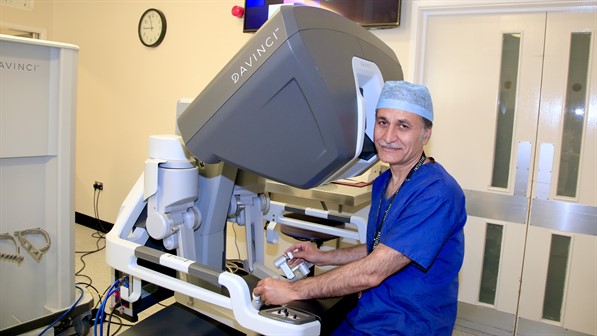Patients in Herefordshire benefitting from £1 million surgical robot
As the NHS celebrates its 75th anniversary today, 5 July, Wye Valley NHS Trust is delighted to announce the arrival of a £1 million surgical robot.
Patients in Herefordshire are benefitting from shorter stays in hospital and a quicker recovery, thanks to the installation of a new of state-of-the-art surgical robot at Hereford County Hospital.
More than 200 patients are set to benefit from this minimally invasive surgery over the next twelve months at Hereford County Hospital.
It provides a range of benefits including more precise surgery, which allows more complex procedures to be carried out quicker, reduced post-operative pain and a quicker recovery for patients.
The new surgical robot, which cost more than £1 million and was funded by NHS England, is being used across a range of specialties, including colorectal, gynaecology and urology at Hereford County Hospital.
The da Vinci X robotic-assisted surgical system is controlled by experienced laparoscopic surgeons who operate the device from within the theatre itself, sitting at a console adjacent to the patient which controls the robotic arms, and translates the surgeon’s hand movements, using a camera and small instruments.
The system gives surgeons an advanced set of instruments to use in performing robotic-assisted minimally invasive surgery. It enables the surgeon to view a patient’s anatomy using a highly magnified, 3D high definition view of the surgical area. It translates the surgeon’s hand movements in real time, bending and rotating the instruments while performing the procedure. The tiny wristed instruments move like a human hand, but with a greater range of motion.
Mr Mehmood Akhtar, urological and robotic consultant surgeon at Wye Valley NHS Trust, who is experienced in robotic surgery, said: “We are delighted to be able to offer this robotic surgery technology to patients locally. It enables surgeons to carry out complex operations with more precision and control than is possible with conventional techniques, resulting in improved patient outcomes.
“It is significantly reducing patient length of hospital stay, so that patients who previously would have been in hospital for five days for urology surgery are now able to return home after one night in hospital.
“It has increased our theatre capacity as procedures are quicker and therefore we are able to treat more patients. We are initially using the robot for cancer surgery across a number of specialities, and we plan to expand this further to benefit more patients.”




